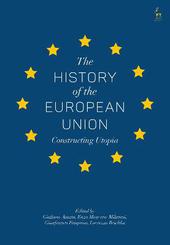
|
The History of the European Union: Constructing Utopia
Hardback
Main Details
| Title |
The History of the European Union: Constructing Utopia
|
| Authors and Contributors |
Edited by Professor Giuliano Amato
|
|
Edited by Enzo Moavero-Milanesi
|
|
Edited by Gianfranco Pasquino
|
|
Edited by Lucrezia Reichlin
|
| Physical Properties |
| Format:Hardback | | Pages:592 | | Dimensions(mm): Height 244,Width 169 |
|
| ISBN/Barcode |
9781509917419
|
| Classifications | Dewey:341.242209 |
|---|
| Audience | | Professional & Vocational | |
|---|
|
Publishing Details |
| Publisher |
Bloomsbury Publishing PLC
|
| Imprint |
Hart Publishing
|
| Publication Date |
7 February 2019 |
| Publication Country |
United Kingdom
|
Description
The European Union celebrated its 60th anniversary in 2017, but celebrations were muted by Brexit and the growing sense of a crisis of identity. However, as this seminal work shows, the history and ambition of the European Union are considerable. Written by key stakeholders who, between them, acted as architects, adjudicators and arbitrators of the project, it presents the definitive history of the first two generations of the European Union. This book revisits the birth and consolidation of the great project of a united Europe and the political, institutional, judicial and economical frameworks of the European Union: from the process towards integration, to the advancements and the impasses in building a political union.
Author Biography
Giuliano Amato is a Judge at the Italian Constitutional Court. Enzo Moavero-Milanesi is the Minister of Foreign Affairs and International Cooperation of the Italian Republic. Gianfranco Pasquino is Emeritus Professor of Political Science, University of Bologna and Senior Adjunct Professor, Hopkins SAIS-Europe as well as a Fellow at Accademia dei Lincei. Lucrezia Reichlin is Professor at London Business School.
Reviews[T]he book's contributors use layered, detailed and sophisticated historical perspectives to build a clear case for federalist solutions whenever possible to resolve tensions emerging from the intrinsic heterogeneity of the European project. As potential solutions to the EU's current woes have to take the complex historical heritage showcased by Amato et al. into account, this book is very relevant for anyone who is interested in a systemic and insightful analysis of the legal, political and economic paths that have shaped the EU since its inception. -- Nandor Revesz, University of Portsmouth * Journal of Common Market Studies *
|